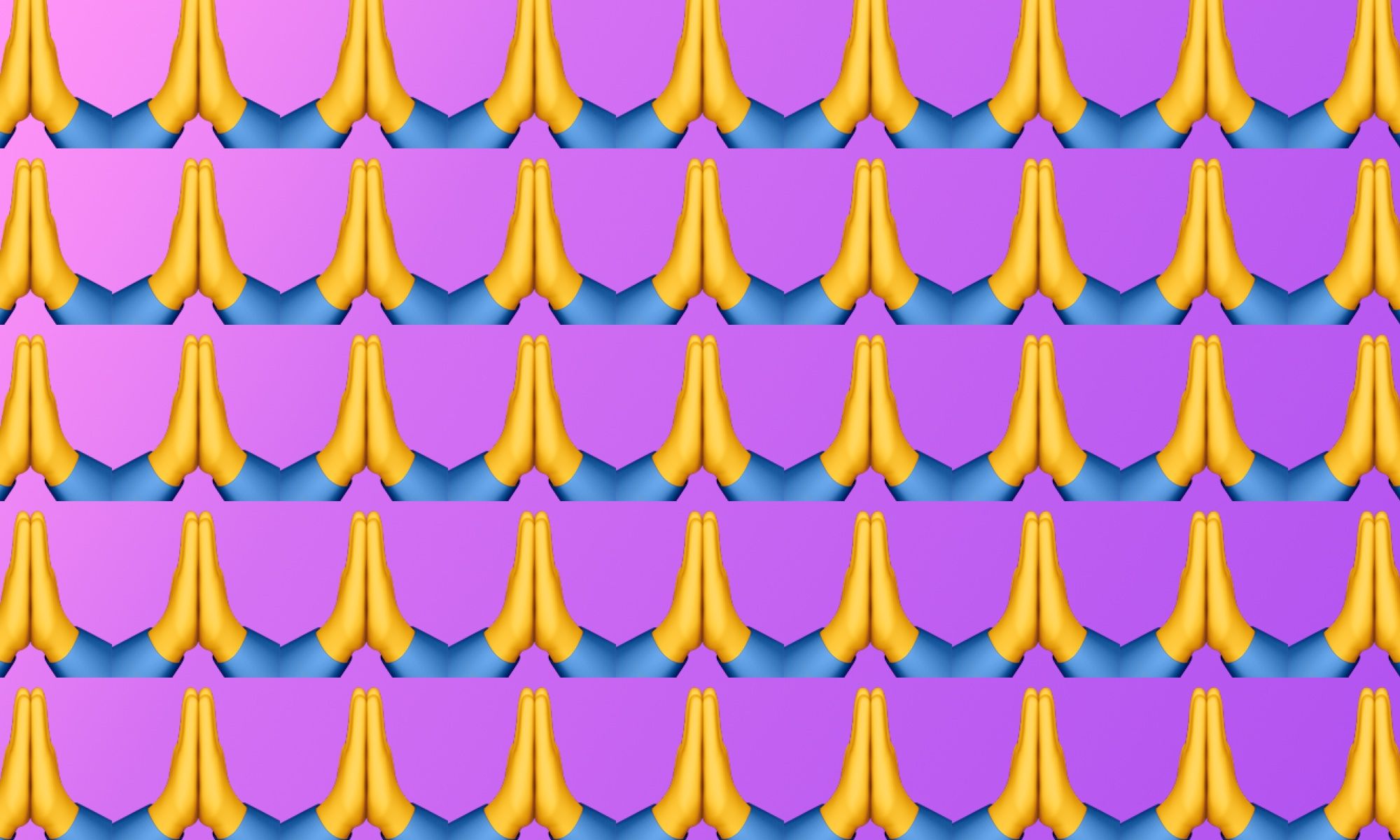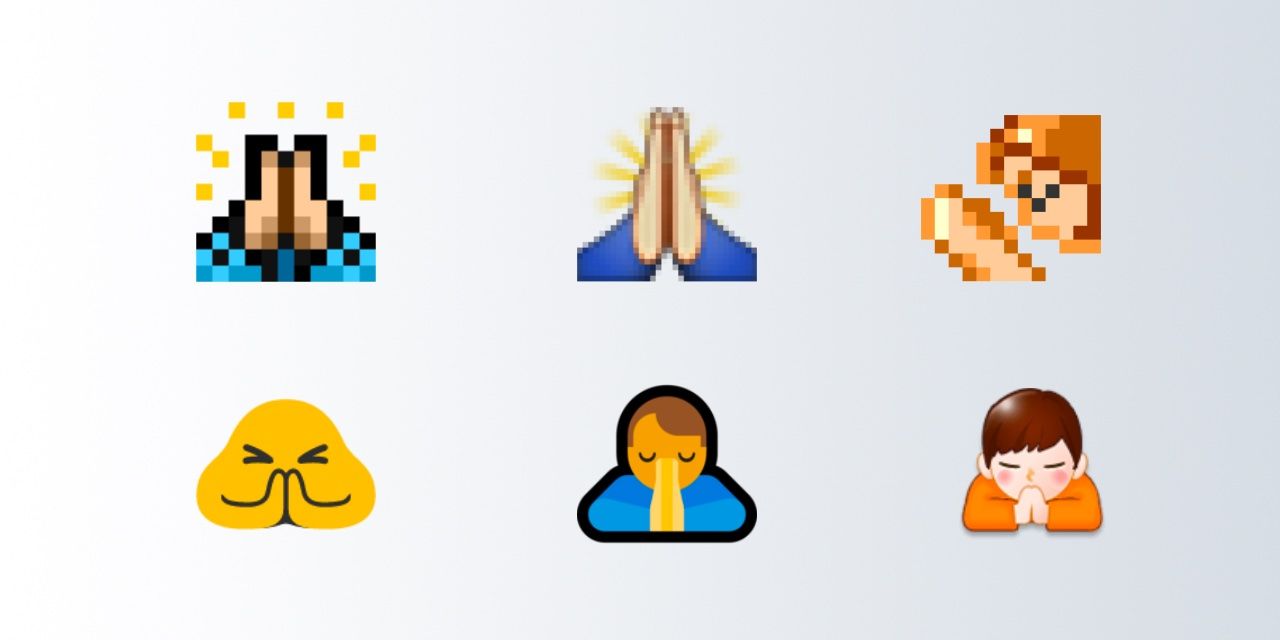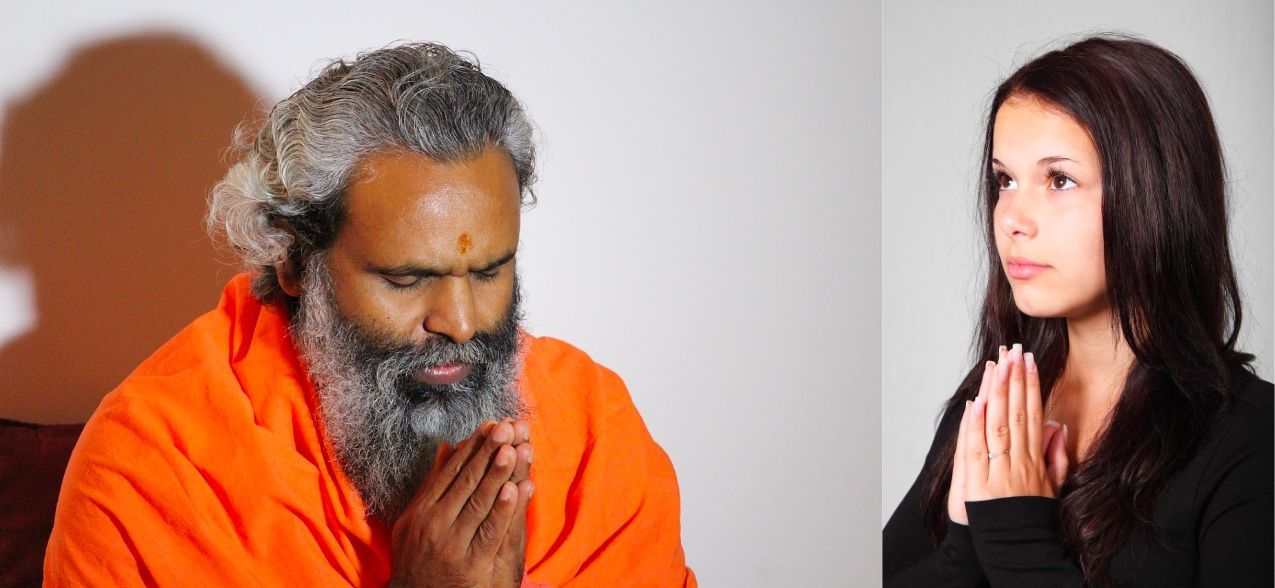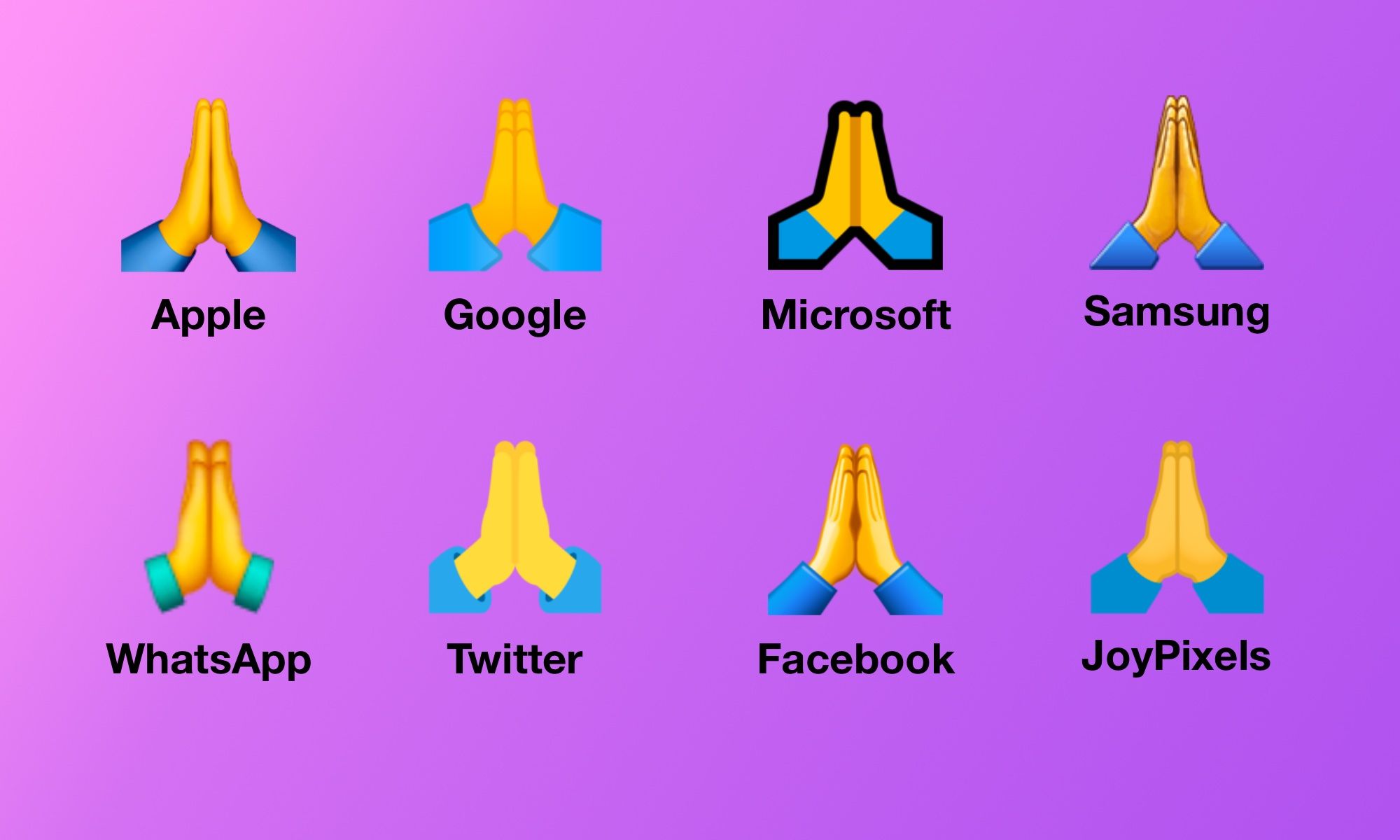High Five Emoji Praying Hamds Funny
Emojiology: 🙏 Folded Hands

As clever as the explanation may be, the children's game of tag is not short for touch and go. Something posh, or luxurious and stylish, isn't so called because swankier cabins on ships traveling between Britain and India were once located port outward, starboard home. And no, shipping manure high in transit is not how we got that more vulgar term for excrement.
These etymological accounts are tempting, but they aren't true. They are urban legends, kept alive by the human hunger for a satisfying story and the viral vim of social media. These forces are no stranger to emojis. They have also gripped 🙏 Folded Hands—or, as one stubborn myth insists, the "high five emoji."
In this Emojiology, let's unfold what's real, what's rumor, and what's reasonable when it comes to high fives and 🙏 Folded Hands.
🔤 Meaning
Depicting two hands pressed together and fingers pointed up, 🙏 Folded Hands is variously used as a gesture of prayer (religious or secular), thanks, request, and greeting as well to express such sentiments as hope, praise, gratitude, reverence, and respect. It is only occasionally applied as a high five, often in reference to the "high five" myth.
💬 Development
We can find rumblings that 🙏 Folded Hands depicts a high five on Twitter in January 2012. These were early days for emojis for many people, and such interpretations of these fun but mystifying newfangled glyphs were—and remain—understandable.
I believe that's a high five emoji "@p2thej115: That's just crazy. Another great singer has left us. Wow. RIP Whitney. 🙏"
— ian - iD4 (@djid4) February 12, 2012
In July 2013—July 22, to be precise—the myth that 🙏 Folded Hands is actually intended to represent a high five spread in earnest on Twitter. Popular news reports and memes fanned the flames into 2014–15, and they still burn today.
Just found out that 🙏 is a high five emoji.... It's reasons like this as to why I have trust issues.
— Peter Hooley (@PeterHooley12) July 22, 2013
I was this years old when I realized this 🙏is high five and not prayers. Which explains why so many text messages made zero sense to me and apologies if my responses seemed confusing.
— Dawn Walton (@CTVdawnwalton) April 22, 2019
Some debunkers point out that the thumbs in 🙏 Folded Hands are together, whereas a high five should depict thumbs in opposite directions, given the orientation of those digits in a conventional high five. Others, like us here at Emojipedia, bust the myth by looking at the history of the emoji.
Many people first encountered emojis on Apple keyboards. At the time the high five rumor takes off, Apple's design for 🙏 Folded Hands featured a golden burst of light emanating from the fingers, which some people apparently—and not unreasonably—thought illustrated the clapping contact of two people's upraised palms meeting in greeting, celebration, or camaraderie.
Apple has supported 🙏 Folded Hands since its iPhone OS 2.2 in 2008, the artwork of its first emoji heavily influenced by SoftBank, as can be seen in the Japanese carrier's version of 🙏 Folded Hands between 2002–06. It's a different early iteration of 🙏 Folded Hands, however, that makes the emoji's original intent more obvious: au by KDDI's 2003 design, which portrays a person with hands folded, head bowed, and eyes closed.

Early designs of 🙏 Folded Hands from Google, Microsoft, and Samsung also featured characters in such a pose. The gesture is commonly associated with Western, Christian prayer. Many Japanese people perform a similar action before a meal while saying itadakimasu, and many in Southeast Asian religions and cultures fold their hands as a respectful greeting or show of adoration, such as the Hindu namaste or Buddhist añjali mudra.

Interestingly, scholars have noted that folded hands as a Christian prayer gesture—said to originate as a display of submission, like a captive stretching out their hands to be bound—isn't well documented in medieval art until after the 1200s. As evidenced in ancient texts from Egyptian scripts to the Old Testament, the gesture was preceded by an older, more universal gesture also represented in emojidom: 🙌 Raising Hands, another glyph some interpret as a high five along with ✋ Raised Hand. Another gesture of prayer, especially associated with Islam, found on emoji keyboards is 🤲 Palms Up Together, theorized to begin as a request for empty hands to be filled by divine beneficence.
By 2015, Apple dropped from 🙏 Folded Hands its stylized yellow lines, which ostensibly symbolized a kind of radiance of hope or gratitude. By 2018, major vendors brought their design in line with Apple's, giving us with two, default-yellow, blue-sleeved hands with palms pressed together under the generic but descriptive Unicode name of Person With Folded Hands.

✅ Examples
True to its form, 🙏 Folded Hands is widely used to represent prayer, whether in religious contexts or more secular ones.
Happy #Easter! Wishing everyone a day filled with blessings and love ✝️💜🙏. pic.twitter.com/j3QOezkFEC
— Hallmark (@Hallmark) April 21, 2019
Stay strong #SriLanka!!
— Hansika (@ihansika) April 21, 2019
Thoughts and prayers. 🙏
The emoji also accompanies other cultural references to folded hand gestures, including the Japanese itadakimasu or Hindu namaste.
With lovely people for lunch, excellent ramen ! 🙏 Itadakimasu ! @MarkMan23 @Lubuns @n8nmonster pic.twitter.com/Yx4BoyqQPo
— Kayane (@Kayane) August 26, 2018
Made it to Everest Basecamp 17,660 feet! 🏔 hardest things I've done mentally and physically-but so liberating on the other side. Feeling very grateful,filled w/ joy + love ❤️ Time to bring the magic of the mountains to every day life! Namaste! 🙏 #WednesdayMotivation pic.twitter.com/eIlqLyQ8go
— Shira Lazar (@shiralazar) April 17, 2019
East meets West in 🙏 Folded Hands, which widely marks expressions of thanks and gratitude.
Thank you to all the people who were so welcoming and supportive of me during the rally today in Dahisar. #AapliMumbaichiMulagi 🙏 pic.twitter.com/78d6ctDFPP
— Urmila Matondkar (@OfficialUrmila) April 22, 2019
Thank you, kind sir. 🙏 Coming from someone such as yourself who has created so many amazing worlds, that is beyond awesome and gracious. Hope to work with you at some point in our futures. 🙌 https://t.co/Tlhpi5lYRr
— Zachary Levi (@ZacharyLevi) April 21, 2019
People also fold their hands together when making requests, whether asking for a simple favor or dramatically pleading for forgiveness. And so we find 🙏 Folded Hands in these contexts as well.
I'm 🙏begging🙏 someone to write a socialist feminist analysis of Hugh Hefner's cultural legacy. @CApuffin ??
— Natalie Shure (@nataliesurely) September 28, 2017
So often underlying thanks and prayer are sentiments of hope and praise, of reverence and respect, which 🙏 Folded Hands can express.
🙏PRAISE YOU BRUNO. I KNEW MY TALENT WOULD BE NOTICED BY YOU AT SOMEPOINT🙏
— Randy Liedtke (@randyliedtke) March 2, 2019
Finally, the emoji does see some occasional, genuine uses as a high five, but this application most often appears to be in reference to the popular debate over 🙏 Folded Hands as the "high five emoji."
✋ High fives all around the world for coming together & taking action for gender equality! 🙏 #NationalHighFiveDay pic.twitter.com/8983Q9lBko
— UN Women (@UN_Women) April 18, 2019
Have we figured out if this is a high-five emoji?! 🙏 Today we're using it as one!#NationalHighFiveDay pic.twitter.com/V0SiwCiQMd
— Phoenix Suns (@Suns) April 18, 2019
🗒️️ Usage
As the last examples show, just because 🙏 Folded Hands isn't officially a high five emoji doesn't mean it can't be used as a digital "Up high! Down low!" even if that meaning isn't widespread.
It's just that we're falling for the old "Too slow!" trick, as it were, when we credit claims that 🙏 Folded Hands is "actually" a high five—because that implies that's what it can only mean or that we're using it incorrectly if we aren't employing it that way. Such stances limit the scope of emojis and our creativity with them. Even if their under-specification can lead to some confusion, it's the versatility and broadness of emojis that make them useful, effective, and expressive.
We have options when we want to express various senses of prayer and thanks in emoji gestures. 🙏 Folded Hands often has a more earnest tone compared to the more exulting "Praise be!" of 🙌 Raising Hands or the more worshipful "I'm not worthy!" of 🙇 Person Bowing. We have options, too, for high fives. 🙏 Folded Hands, on occasion, yes, but also 🙌 Raising Hands, as we've seen, along with a fist bump or two. 🤜🤛
The 🙏 Folded Hands–high five urban legend, in the end, doesn't seem motivated by any malice or mischief. It's meant to be fun—for people want there to be an emoji they can call High Five. And we can put it up there for that. 🙏
Source: https://blog.emojipedia.org/emojiology-folded-hands/

0 Response to "High Five Emoji Praying Hamds Funny"
Postar um comentário